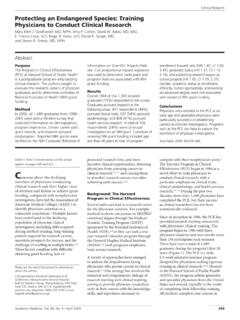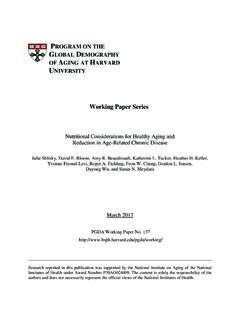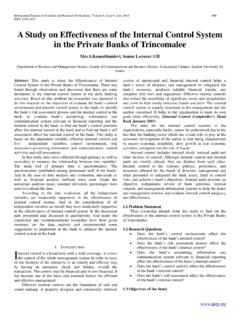Transcription of Public-Private Partnerships for Public Health
1 Partnerships for Public HealthEdited by Michael R. ReichPUBLIC-PRIVATEP ublic- private Partnerships for Public HealthGlobal Health problems require global solutions, and Public -privatepartnerships are increasingly called upon to provide these Partnerships involve private corporations in collaboration with governments, international agencies, and non-governmentalorganizations. They can be very productive, but they also bring theirown problems. This volume examines the organizational and ethicalchallenges of Partnerships and suggests ways to address do organizations with different values, interests, and world-views come together to resolve critical Public Health issues? How areshared objectives and shared values created within a partnership ?How are relationships of trust fostered and sustained in the face ofthe inevitable conflicts, uncertainties, and risks of partnership ?This book focuses on Public - private Partnerships that seek to expand the use of specific products to improve Health conditions in poor countries.
2 The volume includes case studies of partnershipsinvolving specific diseases such as trachoma and river blindness,international organizations such as the World Health Organization,multinational pharmaceutical companies, and products such as medicines and vaccines. Individual chapters draw lessons from successful Partnerships as well as troubled ones in order to helpguide efforts to reduce global Health by:Harvard Center for Population and Development StudiesHARVARD SERIES ON POPULATION AND INTERNATIONAL HEALTHISBN 0-674-00865-0 Public - private Partnerships FOR Public HEALTHE dited by Michael R. ReichHSPHP ublic- private Partnerships for Public HealthPartnerships for Public HealthPUBLIC-PRIVATEE dited by Michael R. ReichHARVARD SERIES ON POPULATION AND INTERNATIONAL HEALTHH arvard Center for Population and Development Studies9 Bow StreetCambridge, Massachusetts 02138 USAA pril 2002 Distributed by Harvard University PressLibrary of Congress Cataloging in Publication DataPublic- private Partnerships for Public Health / edited by Michael R.
3 (Harvard series on population and international Health )Includes bibliographical references and 0-674-00865-0 (paperback)1. Public Health . 2. Public Health Miscellanea. 3. Public - private sector cooperation , Michael R., 1950- II. P834 2002, President and Fellows of Harvard CollegeAll Rights ReservedPrinted in the United States of AmericaPublished by:Harvard Center for Population and Development Studies9 Bow StreetCambridge, Massachusetts and Interior design by Carol Maglitta DesignBooks in the Harvard Series on Population and International HealthPublic- private Partnerships for Public HealthEdited by Michael R. ReichPopulation Policies Reconsidered: Health , Empowerment, and RightsEdited by Gita Sen, Adrienne Germain and Lincoln C. ChenPower & Decision: The Social Control of ReproductionEdited by Gita Sen and Rachel SnowHealth and Social Change in International PerspectiveEdited by Lincoln C. Chen, Arthur Kleinman and Norma C.
4 WareAssessing Child Survival Programs in Developing CountriesBy Joseph J. ValadezContentsPREFACEVIICHAPTER 11 Introduction: Public - private Partnerships for Public HealthMichael R. ReichCHAPTER 219 Public - private Partnerships : Illustrative ExamplesAdetokunbo O. LucasCHAPTER 341 Cross-Sector Collaboration: Lessons from the InternationalTrachoma InitiativeDiana Barrett, James Austin, and Sheila McCarthyCHAPTER 467 The Ethics of Public - private PartnershipsMarc J. Roberts, Breitenstein, and Clement S. RobertsCHAPTER 587A partnership for Ivermectin: Social Worlds and Boudary ObjectsLaura Frost, Michael R. Reich, and Tomoko FujisakiCHAPTER 6115 The Last Years of the CVI and the Birth of the GAVIW illiam MuraskinCHAPTER 7169 The World Health Organization and Global Public -PrivateHealth Partnerships : In Search of Good Global GovernanceKent Buse and Gill WaltCONTRIBUTORS197 INDEX199 VIIP refaceAs we move into the twenty-first century, the face of Public Health is , international Health organizations, and non-governmental organ-izations, once the central actors in Public Health initiatives, are looking to theprivate sector for help.
5 At the same time, private for-profit organizations havecome to realize the importance of Public Health goals for their immediate andlong-term objectives, and to accept a broader view of social responsibility as partof the corporate mandate. Public - private Partnerships are becoming a popularmode of tackling large, complicated, and expensive Public Health problems. Theidea of Partnerships for Public Health has emerged in national as well as interna-tional policy discussions, in both rich and poor countries. Yet the new partnersin these initiatives are strangers to each other in many ways. And we are stilllearning about how best to manage these new Partnerships . We know little aboutthe conditions when Partnerships succeed, about the strategies for structuringpartnerships, or about the ethical underpinnings of Partnerships . In April 2000, the Harvard School of Public Health and the Global HealthCouncil organized a small workshop outside Boston to examine questions aboutpublic- private Partnerships in international Public Health .
6 The two-day meetingbrought together 50 people from diverse organizations and contrasting perspec-tives international agencies, private corporations, development banks, con-sumer advocacy groups, private foundations, non-governmental organizations,developing country government officials, and academics of various stripes toexplore the issues raised by such Partnerships , examine their problems and ben-efits, and address some of the critical questions being raised. The workshop wasjust one in a series of meetings on Public - private Partnerships organized by manydifferent groups around the world in recent years. This flurry of meetings has cre-ated an international dialogue on the role of Partnerships in Health and devel-opment initiatives, seeking to understand how to evaluate, develop, and executepublic Health initiatives that involve both Public and private partners. The examples presented at our workshop all involved at least one privatecorporation from the pharmaceutical industry and at least one Public or non-profit organization, all engaged in international Public Health .
7 We focused onpublic- private Partnerships seeking to expand the use of specific products withthe potential to improve Health conditions in poor countries. For the meeting,we expressly selected papers and participants to represent different views onVIII|PREFACE Public - private Partnerships both critics and supporters hoping that the for-mal and informal conversations would advance our collective and individualthinking. The workshop thus sought to provide: Relevant and insightful scholarship on the issues of Public - private Partnerships An open environment to discuss critical questions about Public - private Partnerships An understanding of both the practical and theoretical dimensions of creatingeffective Partnerships The creation of a shared ethical vocabulary to serve as the basis for successfulpartnerships in the futureThis book presents the results of the workshop.
8 The essays in this volume offersome fresh perspectives on Partnerships , probe some troubling questions, andprovide empirical evidence of both benefits and challenges of Public -privatepartnerships. The participants in the meeting also achieved some progress in cre-ating a shared vocabulary, or at least shared understanding, on points of con-tention, suggesting that dialogue among partisans in Public Health can helpmove debates about critical issues forward. This volume depended on the contributions of many individuals. A. helped organize the workshop with unfailing commitment and goodnature. Professor Marc Roberts, my friend and colleague for the past two decades,provided intellectual support and camaraderie at critical junctures throughoutthe entire project. Scott Gordon and Shoshanah Falek assisted at the workshop,ensuring that the meeting would unfold without major problems.
9 Several col-leagues reviewed chapters (some read all of them) and provided comments forauthors: Marc Mitchell, Scott Gordon, Beatrice Bezmalinovic, and Diana Madsen Hardy edited the entire volume with great care and sensitivity,clarifying ideas without imposing unduly. The Global Health Council agreed toco-organize the workshop, and I appreciate the participation and support pro-vided by the GHC s president, Nils Daulaire. Christopher Cahill, responsible forpublications at the Harvard Center for Population and Development Studies,expertly guided the manuscript through its final journey to appear as a , the authors graciously responded to my comments and queries andrespected the timetables and deadlines. Reflecting on this process reminds methat the production of an edited volume is itself a partnership . While producingPUBLIC- private Partnerships FOR Public Health |IXthe book required more time than I had hoped (the nature of Partnerships ), the volume improved from the contributions of others and truly represents ajoint , I express appreciation for the financial support for the workshop andthe book provided by four organizations: the Edna McConnell Clark Foundation,Merck & Co.
10 , Pfizer Inc, and SmithKline Beecham (now GlaxoSmithKline).While these organizations provided funding for the meeting and are all engagedin Public - private Partnerships , they did not influence the selection of paper writ-ers or topics, the content of the papers, or the agenda for the workshop. Theygranted us independence in organizing the meeting and stood behind ourapproach of inviting people with a broad range of perspectives on Public -privatepartnerships including people of skeptical and critical views supporting ourguarantee of an open discussion from all R. ReichHarvard Center for Population and Development StudiesAugust 20011 Public - private Partnerships for Public HealthMichael R. ReichPUBLIC- private Partnerships ARE AT THE TOP OF MANY AGENDASin interna-tional Public Health these days. When the market fails to distribute Health ben-efits to people who need them especially to poor people in developingcountries Partnerships between Public and private organizations are often seenas offering an innovative method with a good chance of producing the desiredoutcomes.















